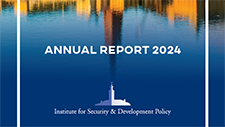Stockholm China Center

The Stockholm China Center (SCC / 斯德哥尔摩中国中心) operates as part of the Institute for Security and Development Policy (ISDP), specializing in providing expert knowledge on geopolitical and security-related developments the People’s Republic of China (PRC). It serves as a platform dedicated to fostering informed dialogue, as well as cross-cultural understanding and cooperation.
International Delegations
The SCC aims to serve as a nexus of academic reflection and international dialogue. The Center regularly invites delegations from ISDP’s partners in Asia to come to Stockholm for seminars, and SCC staff members visit partners in Asia. In addition, the Center’s staff participate in international seminars, conferences and events. Drawing on ISDP’s extensive local network, all visiting delegates have the opportunity to meet with influential figures from the government, academic, and private sectors in Sweden as well as other European countries.
Visiting Fellows Program
The SCC operates a Visiting Fellow Program, hosting scholars from partner institutes in the PRC. During their residency, visiting scholars typically focus on producing publications within their respective areas of expertise. The SCC strives to showcase their work through lectures and seminars, facilitating dialogue and the exchange of perspectives with European researchers. As part of their tenure at the Institute, visiting fellows interact with Sweden’s broader research and policy community, serving as a conduit for mutual understanding and dialogue.
Research
ISDP’s experts, consisting of staff and an extensive network of associated fellows, engage in a wide range of research projects. Results of this work are disseminated in a range of publications, as well as also being made available to the public via seminars, workshops, and comments in the media.
The Center’s research focuses primarily on the following thematic areas:
Relations between China and Europe: China-EU relations have evolved into a complex and often tense dynamic in recent years. Our research delves into China’s approach and the underlying factors driving the evolution of EU countries’ engagement with China, exploring both challenges and opportunities for cooperation. By examining the intricate interplay of interests and priorities between China and the EU, we aim to provide insights into the future trajectory of their relationship and identify potential areas for constructive collaboration.
China’s Indo-Pacific Strategy: China’s Indo-Pacific strategy reflects its expanding geopolitical ambitions and its role as a major player in the region. As China asserts itself more actively, its strategic competition with the United States has become increasingly apparent in the region. Key points of contention include maritime disputes, particularly in the South China Sea, where Beijing’s territorial claims have raised tensions with neighboring states and intersected with the U.S. Navy’s presence. China’s growing influence in the Indo-Pacific is reshaping regional dynamics and challenging traditional power structures, underscoring its significance in the evolving geopolitical landscape.
China-Russia Relations: China-Russia relations have undergone notable consolidation, particularly in the aftermath of the Ukraine war. This trend has witnessed strengthened diplomatic and military ties between the two nations, raising concerns regarding regional stability and security dynamics. The ramifications of China-Russia relations also extend to the Arctic region. Russia’s exclusion from the Arctic Council following the Ukraine invasion has disrupted governance capabilities in the region and bolstered Russia’s militarization efforts, adding further complexity to the geopolitical landscape.
The PRC’s International Security Posture: Beijing has recently sought to refashion its foreign and security policy reflecting a more assertive stance on the international stage. This entails not only a transformation and expansion of the Chinese armed forces, but also concomitant corporate acquisitions and political influence campaigns. The SCC’s research seeks to identify a common modus operandi to frame the big picture of Beijing’s approach to security, in Asia as well as internationally.
Cross-Strait Relations: The Stockholm China Center (SCC) has been actively involved in monitoring and analyzing cross-Strait relations between Mainland China and Taiwan for several years. Through its research efforts, the SCC aims to promote dialogue and understanding among key stakeholders from both sides of the Strait, contributing to stability and peaceful interactions in the region.
Related News
Related Publications
-
PLA in the Arctic: Under the Ice?
The People’s Liberation Army (PLA)’s Arctic ambitions represent a significant expansion of Chinese military capabilities into polar regions, with interconnected aspects worth examining in detail. Turning the PLA into a […]
-
‘Critical to understand internal dynamics of China’: An Interview with FATOUMATA DIALLO
Fatoumata Diallo currently serves as the Acting Head of the Stockholm China Center and is a Research Fellow. With a background that includes working at the EU delegation to China […]
-
ISDP Annual Report 2024
ISDP’s Annual Report for the year 2024. 2024 has been a tumultuous year, in which tensions have been continuously mounting and conflicts have been raging. Many of these developments have […]
-
China, Russia and Undersea Cable Vulnerability: Shoring Up Protection
The global undersea cable network, carrying up to 99 percent of international internet traffic, faces increasing vulnerabilities. Recent incidents in the Baltic Sea and around Taiwan highlight the urgent need […]
-
Ukraine: The Inflection Point in the China-Russia Axis
The ongoing conflict in Ukraine has catalyzed a profound shift in global power dynamics: the deepening of the partnership between China and Russia. This relationship, while rooted in history, represents […]




